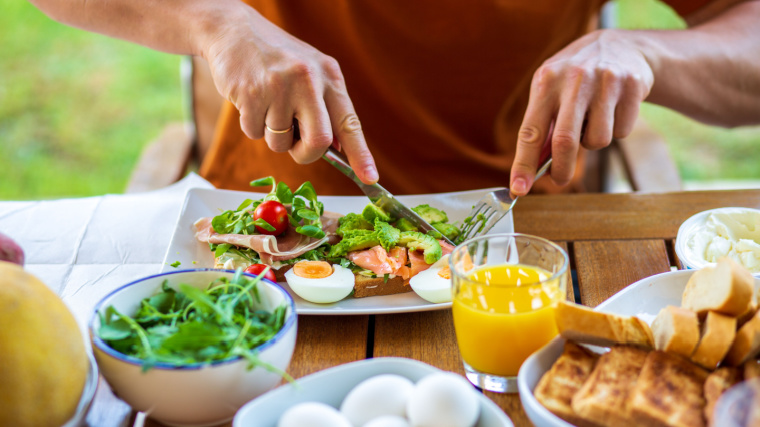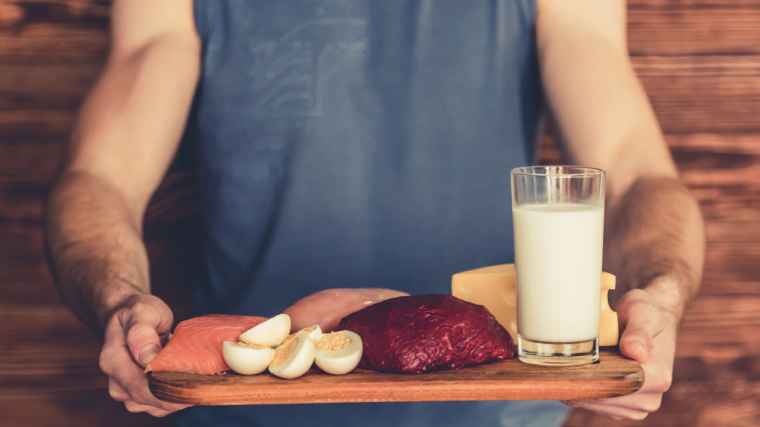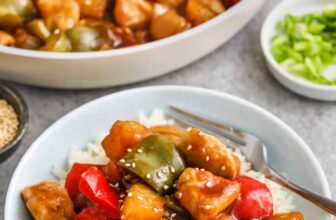Protein is the number one macronutrient that most gym rats and athletes associate with building muscle. It’s usually the centerpiece of a goal-focused diet plan, whether it’s a big serving of grilled meat taking up the majority of room on a plate or a shaker bottle filled to the brim with protein powder.
Some of us don’t mind eating an unvaried diet of the same few foods, day in and day out, year after year. Others need more variety in their diet to accommodate differing tastes, overall compliance, and the simple practicality of eating with family and friends.
With all of the different protein options available, along with some creativity, you will never have to endure a repetitive diet again. Let’s go over a list of 20 high-quality, high-protein, low-carbohydrate foods to make your diet varied, interesting, and, most of all, effective.
Editor’s Note: The content on Breaking Muscle is meant to be informative in nature, but it should not be taken as medical advice. When starting a new training regimen, diet plan, and/or supplement protocol, it is always a good idea to consult with a trusted medical professional. We are not a medical resource. The opinions and articles on this site are not intended for use as diagnosis, prevention, and/or treatment of health problems. They are not substitutes for individualized consulting with a qualified medical professional.
High-Protein, Low-Carbohydrate Foods
The Benefits of a High-Protein, Low-Carb Diet
While protein does function in the repair and building of muscle tissue, it also is used by our bodies for more biological, less obvious, functions including make hormones and enzymes.
Protein also beats fat and carbohydrates for the thermic effect of food (TEF) — the increase in your metabolic rate that naturally occurs after eating. A higher TEF essentially means that you can eat more of it, compared to the two other macronutrients, with less chance of those calories being stored as body fat. (1)
Additionally, protein has a higher satiating effect than the other macronutrients. You’ll feel more full after a meal rich in protein, compared to a meal that’s carb- or fat-dominant. (2) All these benefits of protein can combine to make you leaner, more muscular, more satisfied, and potentially more healthy overall — just by focusing on a relatively high-protein diet.

Depending on your individual goals and current body composition, protein is typically prescribed at 0.8 to 1.25 grams per pound of body weight (1.76 to 2.75 grams per kilogram of body weight). Because athletes and lifters have varying goals for their target weight and body composition, the total calories and macronutrient breakdown are calculated respectively for weight loss, muscular weight gain, or maintenance.
Since protein is most often the macronutrient not drastically changed depending on your specific goal — while carbohydrates and fats are significantly scaled up and down — incorporating enough high-protein, low-carbohydrate food items can be an important part of designing a successful nutrition plan.
The 20 Best High-Protein, Low-Carb Foods
Your individual daily meals certainly don’t need to include each of these foods throughout the day — that would be beyond impractical. However, regularly rotating your protein choices can deliver a variety of micronutrients (including vitamins and minerals), while also adjusting your macronutrients (total carb and fat intake).

While the foods listed are all relatively high in protein and low in carbohydrates, the fat content varies, which allows you to more accurately choose foods that fit your individual plan and goals. Try to get past any reluctance to trying some new foods or new methods of cooking. No rule says your options are limited to “grilled or boiled.”
Eggs
Eggs contain protein and healthy fats. They can be prepared in omelets, stews, scrambles, and frittatas to which meats, vegetables, cheeses, and herbs are often added. This provides a variety of flavors and textures. Hard or soft-boiled eggs can also make a convenient, portable snack, and can be used to complete a range of salads from classic egg salad to a comprehensive “chef’s salad.”
- Serving Size: One large egg
- Protein: 6 grams
- Fat: 5 grams
- Carbohydrates: 1 gram
- Calories: 74 calories
Egg Whites
Using exclusively egg whites in an omelet or scramble is a way to bump up a meal’s protein content without adding extra carbohydrates or fat. The whites can also be used in smoothies and muffins for added texture and volume, along with additional protein. Pasteurized liquid egg whites, sold in cartons, provide convenience because they do not have to be painstakingly separated from the yolks in a whole egg.
- Serving Size: ½ cup
- Protein: 13 grams
- Fat: 0 grams
- Carbohydrates: 1 gram
- Calories: 63 calories
Salmon
Salmon contains protein and heart-healthy omega-three fatty acids. (3) Because it contains a moderate amount of fat, it has a smooth mouthfeel unlike some more lean fish. It can be pan-fried, roasted, poached, broiled, or grilled, or even served over a salad. Salmon is also available canned and pre-cooked, making it a convenient, go-to source of protein when short on time.
- Serving Size: 6 ounces
- Protein: 40 grams
- Fat: 22 grams
- Carbohydrates: 0 grams
- Calories: 236 calories
Sardines
Sardines, like salmon, are another source of protein and omega-three fatty acids. The fresh variety can be similarly pan-fried, broiled, roasted, or grilled, or served over a salad. They are commonly available canned, packed either in water or oil, sometimes available with a variety of herbs, seasonings, and sauces, making them another convenient source of pre-cooked protein. Oil-packed sardines will contain higher levels of fats.
- Serving Size: 6 ounces
- Protein: 42 grams
- Fat: 19 grams
- Carbohydrates: 0 grams
- Calories: 354 calories
Tuna
Tuna is a low-fat source of protein. Again, the fresh variety can be pan-fried, baked, or grilled, or served over a salad. It is commonly available canned or in pouches, packed in water or oil. Oil-packed tuna will contain higher levels of fats.
- Serving Size: 6 ounces
- Protein: 42 grams
- Fat: 3 grams
- Carbohydrates: 0 grams
- Calories: 190 calories
Shrimp
Shrimp is a lean shellfish that has relatively few calories for its volume. A relatively large amount can be eaten without necessarily “overeating,” making it a satisfying choice for people on weight-loss diets.
It can be grilled, sauteed, baked, or skewered for kebabs. It’s also a popular choice for tacos, burritos, and seafood salads. High-quality shrimp may be served raw in shrimp ceviche — a salad in which acid from citrus juice and onion denature its protein, instead of traditional cooking.
- Serving Size: 6 ounces
- Protein: 35 grams
- Fat: 3 grams
- Carbohydrates: 2 grams
- Calories: 180 calories
Pork Chops
Pork chops are a source of protein with varying amounts of fat depending on the cut. Because some cuts are fairly lean and subject to dryness, they are sometimes brined or marinated before cooking, adding both moisture and flavor. They are suitable for pan-frying, grilling, or roasting. They are available bone-in or boneless.
- Serving Size: 6 ounces
- Protein: 36 grams
- Fat: 18 grams
- Carbohydrates: 0 grams
- Calories: 306 calories
Pork Shoulder
Pork shoulder is a moderate-fat source of protein. It is a traditional barbecue item and can be braised, smoked, roasted, or skewered. It can be used in tacos, sandwiches, salads, soups, stews, and pasta, or served on its own as a main entree.
- Serving Size: 6 ounces
- Protein: 63 grams
- Fat: 30 grams
- Carbohydrates: 0 grams
- Calories: 454 calories
Ham
Ham is a relatively lean source of protein. It is a pork leg cut that has been preserved by curing. It is sometimes additionally preserved by smoking. It can be consumed in sandwiches, omelets, frittatas, pasta, rice dishes, salads, or as a main entree.
- Serving Size: 6 ounces
- Protein: 37 grams
- Fat: 8 grams
- Carbohydrates: 2 grams
- Calories: 236 calories
Sirloin Steak
Sirloin is one of the leaner cuts of steak. It can be prepared by grilling, roasting, pan-frying, or skewered for kebabs. Like most cuts of steak, it is commonly served as a main entree, but can be served over salads, alongside eggs at breakfast, and in sandwiches, fajitas, tacos, omelets, or frittatas.
- Serving Size: 6 ounces
- Protein: 52 grams
- Fat: 8 grams
- Carbohydrates: 0 grams
- Calories: 300 calories
Strip Steak
Strip steak is another relatively lean cut of red meat. It can be prepared in a variety of ways, nearly interchangeable with sirloin.
- Serving Size: 6 ounces
- Protein: 48 grams
- Fat: 6 grams
- Carbohydrates: 0 grams
- Calories: 294 calories
Ribeye Steak
Ribeye steak is a higher-fat steak with much marbling and a strong flavor. It can be prepared similar to other cuts of steak. The higher fat content should be taken into consideration when preparing and serving, as ribeye will yield a higher calorie meal.
- Serving Size: 6 ounces
- Protein: 40 grams
- Fat: 37 grams
- Carbohydrates: 0 grams
- Calories: 494 calories
Lean Ground Beef
Lean ground beef has a fat content of 5%, which can be preferred over higher fat ground beef options to monitor total calorie intake. It can be used to make hamburgers, meatballs, meat sauce, stuffed peppers, tacos, burritos, or a classic meatloaf.
- Serving Size: 6 ounces
- Protein: 44 grams
- Fat: 10 grams
- Carbohydrates: 0 grams
- Calories: 280 calories
Beef Liver
A staple of bodybuilding diets back in “the old days,” beef liver and other organ meats have made a comeback on some personal menus thanks to its consumption being dubiously promoted on social media. Like other organ meats, liver has a strong flavor and it tends to either be loved or intensely disliked. It can be prepared by grilling or pan-frying.
- Serving Size: 6 ounces
- Protein: 50 grams
- Fat: 9 grams
- Carbohydrates: 8 grams
- Calories: 324 calories
Cottage Cheese
Cottage cheese is a dairy product consisting of curds and whey from skimmed milk, to which cream is added. It has a sour flavor, and it can be eaten on its own, with pasta, on toast, or with granola, nuts, fruit, or vegetables. It is commonly available in fat-free, 1%, 2%, and 4% (whole or full-fat) varieties.
- Serving Size: 1 cup, 4% (full-fat)
- Protein: 25 grams
- Fat: 8 grams
- Carbohydrates: 8 grams
- Calories: 222 calories
Greek Yogurt
Greek yogurt is yogurt strained of most of its whey, giving it a thicker consistency and higher-protein content than a similar volume of more common, unstrained yogurt. It can be eaten plain, topped with fruit, granola, seeds, or nuts, and used in smoothies. It is available in fat-free, 2%, and full-fat varieties. Note that many pre-flavored Greek yogurts often contain higher levels of carbohydrates from added sugar.
- Serving Size: 1 cup, 2%
- Protein: 24 grams
- Fat: 3 grams
- Carbohydrates: 9 grams
- Calories: 160 calories
Chicken Breast
Chicken breast is a quintessential muscle-building food because it is a low-fat source of protein that can be eaten in a variety of forms. It can be poached, grilled, pan-fried, roasted, or skewered for kebabs. It can be cut and served in sandwiches, on salads, in omelets, soups, frittatas, quiches, and tacos, or served as a showcase main entree.
Because of a mild flavor, it can serve as a blank slate for flavor profiles of your choice. Don’t be afraid to experiment with seasonings beyond simple salt and pepper.
- Serving Size: 6 ounces, boneless/skinless
- Protein: 52 grams
- Fat: 6 grams
- Carbohydrates: 0 grams
- Calories: 281 calories
Chicken Thighs
Chicken thighs are a protein source moderate in fat. Like chicken breast, thighs can be eaten in a wide variety of forms. They can be braised, pan-fried, roasted, grilled, or skewered for kebabs. They can also be used in stews, soups, quiches, tacos, sandwiches, and tacos, or used as a main entree.
- Serving Size: 6 ounces, boneless/skinless
- Protein: 42 grams
- Fat: 15 grams
- Carbohydrates: 0 grams
- Calories: 310 calories
Whey Protein Powder
Whey protein powder is a convenient, low-fat, low-carbohydrate protein. It is dried whey, which is the portion of milk that separates from curds during cheesemaking. It is a convenient protein source, with a shaker bottle or blender, a protein shake can be made in seconds and carried out the door.
Other items, such as fruit, nut butters, vegetables, and different kinds of milk or milk alternatives can be added to make a customized smoothie. Whey protein can also used in recipes for pancakes, muffins, cakes, and even cookies. Note that scoop portions and specific macronutrients will vary between brands and flavors.
- Serving Size: 1 scoop (31 grams)
- Protein: 24 grams
- Fat: 3 grams
- Carbohydrates: 3 grams
- Calories: 120 calories
Casein Protein Powder
Casein protein powder is another convenient, low-fat, low-carbohydrate protein. It is dried casein, the milk protein of curds. Casein is sometimes considered a “slow digesting” protein, allowing it to increase feelings of satiety and curb hunger for longer periods. (4) The same method and recipes used for whey protein powder can be used for casein. Similarly, the scoop portions and specific macronutrients will vary between brands and flavors.
- Serving Size: 1 scoop (33 grams)
- Protein: 24 grams
- Fat: 0 grams
- Carbohydrates: 3 grams
- Calories: 110 calories
Sample High-Protein Menu Plan
Now that you have a list of a wide variety of protein-packed foods, here is an example of a day’s menu for a 200-pound (90.7-kilogram) athlete. Seeing a full day’s plan should help you see how to work high-quality protein choices into your diet.

The sample plan is calculated to provide approximately 1.25 grams of protein per pound (2.75 grams per kilogram) of body weight, 3,500 total calories, 20% of the calories from fat, and the remaining calories from carbohydrates. This is a general, effective guideline for athletes and offseason bodybuilders.
Meal One
- Omelet — 1 cup egg whites, 1 whole egg, 1-ounce ham, ½-cup cooked spinach
- Cream of Wheat cereal — 1 cup
- Banana — 1 medium
Total: 50 grams protein, 9 grams fat, 106 grams carbs, 684 calories
Snack One
- Smoothie — 1 scoop whey protein powder, ½ cup 2% Greek yogurt, 1 tablespoon peanut butter, ½-cup oatmeal, 1 cup frozen fruit, 2 cups water
Total: 45 grams protein, 16 grams fat, 53 grams carbs, 505 calories
Meal Two
- Broccoli — 1 cup, cooked
- Chicken Breast — 6 ounces, boneless/skinless
- Rice — 2 cups
- Avocado — 1 medium
Total: 65 grams protein, 28 grams fat, 107 grams carbs, 949 calories
Snack Two
- Full-Fat (4%) Cottage Cheese — 1 cup
- Granola — 1 cup
Total: 34 grams protein, 15 grams fat, 57 grams carbohydrates, 390 calories
Meal Three
- Asparagus — 1 cup, cooked
- Sirloin Steak — 6 ounces
- Potato — 10 ounces, baked
- Butter — 1 tablespoon
Total: 67 grams protein, 19 grams fat, 118 grams carbohydrates, 905 calories
Daily Total
- Protein — 261 grams
- Fat — 87 grams
- Carbohydrates — 441 grams
- Calories — 3,433 calories — 30% protein, 22% fat, 51% carbohydrates
A Protein-Packed Plan
Now you have the knowledge to work a variety of high-protein foods into your diet without compromising on quality or nutrition, and without settling for a humdrum existence rotating between the same two or three protein sources. Setup an overall plan that suits your physique or performance goals, and make adjustments as needed to ensure success. Get out your calculator, pen and paper, frying pan, and grill, and get to it.
References
- Westerterp K. R. (2004). Diet induced thermogenesis. Nutrition & metabolism, 1(1), 5. https://doi.org/10.1186/1743-7075-1-5
- Leidy, H. J., Clifton, P. M., Astrup, A., Wycherley, T. P., Westerterp-Plantenga, M. S., Luscombe-Marsh, N. D., Woods, S. C., & Mattes, R. D. (2015). The role of protein in weight loss and maintenance. The American journal of clinical nutrition, 101(6), 1320S–1329S. https://doi.org/10.3945/ajcn.114.084038
- Khan, S. U., Lone, A. N., Khan, M. S., Virani, S. S., Blumenthal, R. S., Nasir, K., Miller, M., Michos, E. D., Ballantyne, C. M., Boden, W. E., & Bhatt, D. L. (2021). Effect of omega-3 fatty acids on cardiovascular outcomes: A systematic review and meta-analysis. EClinicalMedicine, 38, 100997. https://doi.org/10.1016/j.eclinm.2021.100997
- Hoffman, J. R., & Falvo, M. J. (2004). Protein – Which is Best?. Journal of sports science & medicine, 3(3), 118–130.
Featured Image: VasiliyBudarin / Shutterstock
Trending Products














